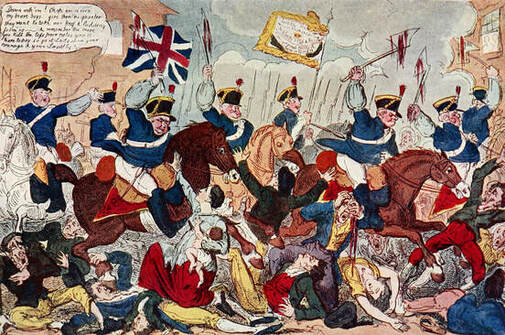| The magistrates of Manchester, watching the assembly from an upstairs window, panicked and sent a troop of undisciplined and possibly drunk Yeoman Cavalry into the crowd to arrest Hunt before he could speak. The cavalry, composed of the sons and social peers of local mill owners, decided to confiscate the banners carried by various groups, and they pushed their way into the tightly-packed crowd, hacking with their swords. Mayhem ensued, hundreds were injured and at least 19 were killed. The melee became known as "Peterloo,"; a mocking reference to Waterloo, contrasting the soldiers at Waterloo with the brutality of the Yeoman cavalry who attacked defenseless people. |
| "Unhappily, for a long series of years, but since the commencement of the French Revolution, a malignant spirit has been abroad in the country, seeking to ally itself with every cause of national difficulty and distress... it has employed itself in exaggerating calamity and fomenting discontent... a very large proportion of them indeed have parliamentary reform in their mouths but rebellion and revolution in their hearts." -- Lord Sidmouth, speaking of the radical movement. | |
In addition to being fascinating source material, these videos are great for people (like me) who love a good, long rolling 19th century sentence and 19th century modes of expression.
| The series includes the correspondence of government officials who were worried about radical uprisings. There had been reports of working men meeting in common lands and engaging in drill practice in a military fashion. Many feared the country was on the brink of revolution, and people hadn't forgotten the horrors of the French Revolution. Fears of instability and anarchy made it easy to paint all reformers as dangerous radicals. The government of the day used spies to attend radical meetings and sometimes used agent provocateurs, just as the United States government infiltrated the radical movements of the 1960s. | Here is a very entertaining letter from travelling actors, offering to spy for the government and report any seditious activity. "Educated for superior professions, we, from various circumstances, have adopted the stage for sustenance." They explain that their sympathies are with the government but they can mix unsuspected with the working class. ""We could prove beneficial in stemming the torrent of insurgency..." #18 is one of two readings in this video series (the other is #10) where the re-enactor portrays his character as a sneering, evil, Bad Guy. In real life, most people believe they are acting out of good intentions, even if they are deluding themselves. |
If the crowd did get out of hand and started smashing, looting and burning, there was no such thing as a professional, trained police force in those days. The magistrates relied on deputy constables (ordinary men sworn into service for the occasion) and amateur militia. This all led to disaster at Peterloo. The chief constable (a nasty bully who was despised by the working class people of Manchester) was ordered to go through the crowd and arrest Henry Hunt before he could even begin to speak. He refused to do it without armed backup. So the magistrates summoned the local yeoman cavalry, who were waiting nearby in case of trouble on the day of the rally.
| There was a professional newspaperman, John Tyas, present on the hustings that day. He reports Henry Hunt gave himself up peaceably. Then some of the cavalry shouted, "have at their flags" and rode into the crowd. "This set the people running in all directions... the Manchester yeomanry lost all command of temper." "Was that meeting at Manchester an unlawful assembly? We believe not... Was anything done at this meeting before the cavalry rode in upon it, contrary to the law or in breach of the peace? No such circumstances are recorded in any of the statements which have yet reached our hands." | |
| | Here is the petition of Mary Fildes, who was on the platform with Henry Hunt at the rally. She was a working-class woman and the president of the Manchester Female Reform Society. She was holding one of the banners (inscribed with slogans asking for political reform) and she was attacked by the cavalry. Like the other Manchester attendees, she reports that the cavalry attacked the people without provocation. The magistrates later testified that they thought it was the cavalrymen, individually surrounded on all sides by thousands of angry people, who were the ones in danger of harm, and that's why they called up additional troops to rescue them. |
Accounts of what actually happened at Peterloo varied, as did the reactions. In the aftermath, the government cracked down severely on civil liberties, suspending habeas corpus for a time.
It remains a mystery to me why the magistrates, having allowed the assembly to happen, (they had already cancelled and forbidden a previous meeting) chose to cut it short just as it was beginning, before there was any sign of trouble whatsoever. Because of course this caused frustration and anger in the crowd. The magistrates broke up a legal and peaceful assembly and the government had to stand by them after the fact. Below is an excerpt from a speech by George, Lord Canning in the house on November 24, 1819, defending the decision of the Magistrates. He also mentions a technique I think is still prevalent today in political life.
| Here is an earlier blog post in my Clutching My Pearls series, discussing Jane Austen's attitude toward the militia and that conversation about a riot in London in Northanger Abbey. This BBC In Our Time radio podcast explains some of the nuances of this period of history; the authorities were coping with the war and its aftermath, and not every working-class person held radical views. |



 RSS Feed
RSS Feed